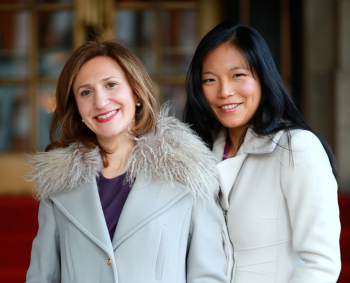February 2, 2016
New crowdsourcing efforts seek to reveal the truth about workplace culture and policies that affect women.

Georgene Huang never expected to be fired from her job in a management shake up when she was two months pregnant. Nor did she expect to be in the awkward position of interviewing for a new job with a baby on the way.
“I had a lot of questions in my interviews that I didn’t feel I could ask, even though it was 2014– like, what the hours are really like and what work-life balance really looks like,” Huang told us.
She turned to employer review sites including, Glassdoor, for information, but she was disappointed with the lack of focus on workplace issues that affect women. She wanted to get the inside scoop on what the likelihood of promotion might look like for women at a particular firm or if the management truly respected family commitments and how that might play out.
So she decided to chase down the real answers by asking women to anonymously share their experiences. Then she and her business partner Romy Newman began to dig into the data. Their efforts gave way to Fairygodboss, a new tool pulling the curtain back on company culture through the first-hand accounts of women in the trenches. Launched last March, Fairygodboss has already been hailed in the media as the “Yelp for maternity leave.” With more than 20,000 reviews and tips gathered to date, the site offers women a platform to candidly review and rate their employers on compensation, benefits, leave, opportunities for advancement and work environment.
“I think lots of women want to help other women and they embrace this idea of a forum,” says Huang, who is proud of the rapid growth and the in-depth detail of the reviews.
These two are not alone in their mission to provide transparency around workplace cultures and policies.
Ursula Mead started InHerSight to give users a way to rate companies across 14 female-friendly metrics, including female representation in top leadership and family growth support. “A great company culture is not the same thing as a great environment for women,” says Mead.
Mead was inspired, in part, by Anne-Marie Slaughter’s 2012 article in The Atlantic, “Why Women Still Can’t Have It All.”
“There’s a whole movement underway to better understand what women are facing at work and figure out how to improve the situation,” Mead explains. “More than ever, women are such top talent that organizations are going to be competing for them. We need to use that as an opportunity to make the change we need to be successful.”
Many of the issues that have prompted discussions around female-friendliness, such as parental leave and work/life balance, affect all workers, especially as half of American employees now work over 40 hours a week.
In an effort to promote equality for women and men, Melissa Sandgren, a Yahoo manager, is crowdsourcing parental leave data.
“Companies can play a pivotal role in breaking gender confines and redefining gender norms, and one way to alter this dynamic is by offering equal parental leave, regardless of gender norms, gender identity, leave status (birth or adoptive), or sex,” Sandgren wrote in a recent Medium post.
In her view, equal parental leave—the same time off for new moms and dads—will translate to a more equitable workplace.
“Unequal parental leave disproportionately affects women, creating a dynamic where the person with the longer parental leave (usually the female) will be more familiar with the new child’s habits, needs, expressions; thus, quickly becoming the ‘lead parent,” she writes.
This leads to the “double shift” effect where women continue to be double-bound by dual duties- at home and at the office.
Fairygodboss also plans to crowdsource data on leave for both moms and dads.
“If you have parental leave in a culture then you are much more inclined to have gender equality in the workplace,” says Newman.
Many companies are already catching on. Netflix lets new moms and dads take unlimited time off for a year after a birth or adoption. Facebook gives new parents $4,000 in “baby cash” in addition to 17 weeks of paid leave.
Parental leave is not just a woman’s issue, but many women, especially those in male-dominated industries, may not feel comfortable speaking up. By providing transparency and data points around workplace culture, the founders of these crowdsourcing efforts hope to make a difference.
“We’ve zoned in on what women say when they’re happy or unhappy at work. We think it highlights some ways that employers can focus their energy,” Newman of Fairygodboss says.






